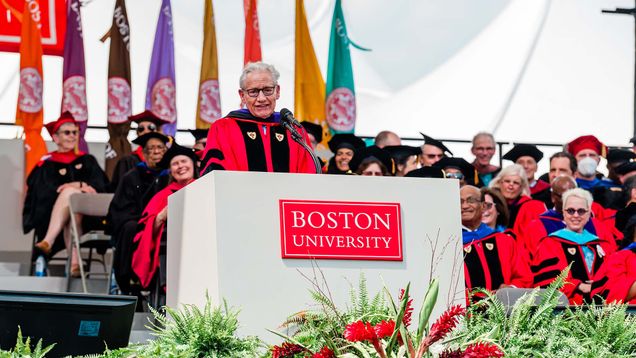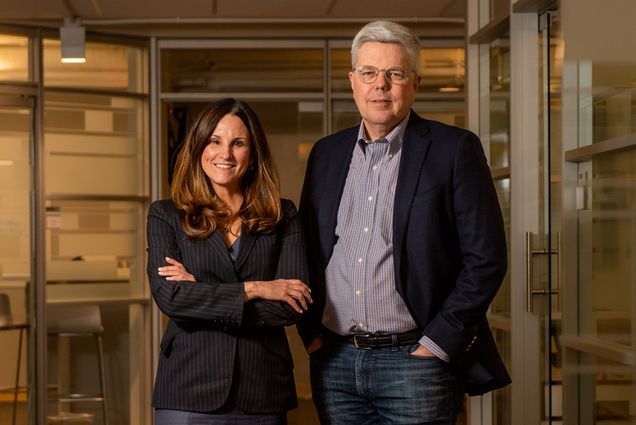News
Climate Workforce, First-Gen Grads, Green Spaces & Dementia
BU IN DC
Building The Next Generation Climate Workforce with Congresswoman Suzanne Bonamici
On June 9th, Congresswoman Suzanne Bonamici (D-OR) and experts in solutions-oriented graduate education and workforce training will share how policymakers can support programs that empower leaders from diverse backgrounds to solve complex climate challenges.
ON THE CHARLES RIVER
For These First-Gen Students, Graduation is Moment of Pride and Achievement
Members of the BU chapter of First-Generation Low Income Partnership reflect on their journey and what their legacy will be.
RESEARCH HIGHLIGHT

Living Near Greenery Could Give You a Brain Boost—and Reduce Dementia Risk
A BU School of Public Health-led study finds that middle-aged women exposed to more green space may benefit from higher cognitive function, slower mental decline, and reduced depression.
THOUGHT LEADERS
In Case You Missed It...
City of Boston Mayor Michelle Wu appointed BU School of Public Health DeanSandro Galea as chair of the Boston Public Health Commission... BU Dean of Students Kenneth Elmore is leaving BU to become president of Dean College... Scott Solberg of BU Wheelock College of Education & Human Development says a lack of workforce training programs has led to an economic crisis in Politico... Emily Rothman of BU Sargent College explains how celebrity cases of dating violence influence the public discourse about abuse in Time... Arianne Chernock of the BU College of Arts & Sciences discusses why Americans are tuning in to Queen Elizabeth II's Platinum Jubilee in The Conversation.
Dean of Students Kenneth Elmore Leaving BU to Become President of Dean College
Whether leaping into the Charles River or comforting a grieving family, he’s been the face of BU for the student body for two decades.
The Quest for a Heart Attack Cure
A BU-led team is engineering small patches of cardiac muscle that could repair the heart, treat heart disease, and speed drug development.
Antibiotic Resistance: A Looming Public Health Crisis
BU Prof. Kevin Outterson joined Sen. Michael Bennet (D-CO) and others for a Capitol Hill briefing to discuss tackling the growing threat of antibiotic resistance on May 24, 2022 at 1:00 PM (ET).
Speakers:
- Sen. Michael Bennet (D-CO), Member, Senate Agriculture Committee
- Rep. Drew Ferguson (R-GA), Member, Ways and Means Committee
- Dawn O’Connell, Assistant Secretary for Preparedness & Response, Dept. of Health & Human Services
- Lilian Abbo, MD, Professor of Infectious Diseases, University of Miami; Board of Directors, Infectious Diseases Society of America
- Christopher Burns, PhD, Founder, President & CEO, Venatorx Pharmaceuticals
- Brandon Noble, Survivor & former NFL Player
- Kevin Outterson, Executive Director, CARB-X; Professor of Law, Boston University
Sponsor Perspective:
- David Hyun, MD, Director, Antibiotic Resistance Project, The Pew Charitable Trusts
Moderator:
- Bob Cusack, Editor-in-Chief, The Hill
Climate Workforce, Commencement, Antimicrobial Resistance
BU IN DC

Building The Next-Generation Climate Workforce
Join us for a virtual briefing on June 9th to learn how policymakers can support solutions-oriented graduate education and workforce training that equips leaders from diverse backgrounds to solve complex climate challenges.
ON THE CHARLES RIVER

Journalist and Author Bob Woodward Tells BU Grads: Mistakes Are Life's Best Guide
Addressing the Class of 2022, Woodward tells graduates, "Don’t be in a hurry to do what may be the wrong thing in your life... Stay engaged.…Play a part, either small or large. Pitch in in some way."
FACULTY EXPERT

Can We Prevent Antibiotic Resistance?
Antibiotics are losing effectiveness—and millions are dying as a result. CARB-X, a BU-based partnership that aims to solve antimicrobial resistance, has been given up to $370 million in new funding from the US government and charitable foundation Wellcome.
See how we're solving the problem
THOUGHT LEADERS
In Case You Missed It...
Kevin Outterson of the BU School of Law will join Sen. Michael Bennet (D-CO) and Rep. Drew Ferguson (R-GA) tomorrow for a virtual panel discussion on antibiotic resistance hosted by The Hill... The White House cited data from the BU Initiative on Cities Menino Survey of Mayors that indicates more than a quarter of the nation's mayors anticipate making significant cuts to their police budgets and services... BU College of Fine Arts Dean Harvey Young writes that the recent shooting in Buffalo exposes his hometown's history of segregation in The Chicago Tribune... Astraea Augsberger and Mary Elizabeth Collins of the BU School of Social Work explain how persistent childhood poverty is overwhelming the child welfare system in The Conversation... Mayank Varia of the Hariri Institute for Computing discusses how cryptographic research can inform public policy.
Massachusetts US Attorney Rachael Rollins Tells LAW Grads, This Is “the Fight of Our Lives”
The law is a noble profession, don’t be afraid to fail, and get in the game, she said.
Baccalaureate Speaker Marylou Sudders (CAS’76, SSW’78, Hon.’22) Reflects on Pandemic’s Lessons
Massachusetts Secretary of Health & Human Services commended BU’s role in pandemic response.
Commencement: a Moment of Pride and Achievement for These First-Gen Students
Graduating E-board members of First-Generation Low Income Partnership (FLIP) reflect on their journeys and the legacy they leave.
Equity in Science, NIJ Director, Population Health
BU IN DC
Naomi Caselli of Wheelock College of Education & Human Development gave the graduate commencement address at Gallaudet University on May 13th.
Associate Provost for Computing & Data Sciences Azer Bestavros attended a virtual meeting of the National Science Foundation’s Computer & Information Science & Engineering Advisory Committee, of which he is a member, on May 16th and 17th.
Julie Wickstrom of Financial Assistance discussed federal student aid with Congressional staff during Higher Education Loan Coalition meetings on Capitol Hill on May 16th and 17th.
Kevin Outterson of the School of Law and CARB-X spoke at a Capitol Hill panel discussion about antibiotic resistant infections hosted by the Partnership to Fight Infectious Diseases on May 18th.
OSTP DIRECTOR URGES INCLUSIVE RESEARCH METHODS
Acting Director of the White House Office of Science and Technology Policy (OSTP) Alondra Nelson spoke about co-producing knowledge with communities as a means to promote federal research equity during an address to the National Academies of Sciences, Engineering, and Medicine on May 12th. Dr. Nelson explained that co-production puts diverse communities at the center of a research project, with scholars meaningfully considering a community's knowledge and expertise and inviting members of the community to be intimately involved in a project and its outcomes. Nelson indicated that co-production is critical to carrying out President Joe Biden's goals of addressing societal grand challenges, such as climate change and addressing racial inequities. She also fielded questions on the need to make scientific data more understandable and usable as well as the importance of addressing certain communities’ mistrust in the government.
BUZZ BITS...
- The National Aeronautics and Space Administration (NASA) is requesting input on NASA's draft Moon to Mars objectives. Stakeholders can provide feedback on NASA's scientific plans related to exploration, planetary and lunar science, heliophysics, biology and physics, and astrophysics. Comments are due by May 31st.
- Earlier this month, President Joe Biden appointed Dr. Nancy La Vigne as director of the National Institute of Justice, the research arm of the U.S. Department of Justice. Dr. La Vigne is a criminal justice policy expert who has worked at a number of think tanks.
- Senior leaders from the National Institutes of Health (NIH) testified before the Senate Appropriations Committee on Tuesday to discuss the President's fiscal year 2023 budget request for NIH. Lawmakers of both parties expressed concern with the Administration's proposal to invest heavily in the new Advanced Research Projects Agency-Health while maintaining a flat budget for NIH.
EVENTS NEWS YOU CAN USE
The Hariri Institute for Computing and Computation Science & Engineering is hosting a day-long workshop on June 6th for researchers to explore how systems science and simulation modeling can be used to advance public health and reduce health inequities. Speakers include Dr. Kellina Craig-Hendersen, Deputy Assistant Director for the Social, Behavioral and Economic Sciences Directorate at the National Science Foundation, who will discuss the importance of the social sciences in adopting these methods. The BU community is invited to join researchers from around the country to investigate the barriers preventing wide-spread adopting of simulation methods in population health and how they can be addressed.

